Rick Simpson Oil (RSO) has been gaining attention in the cannabis market, named in honor of Rick Simpson, a Canadian engineer and advocate for medical cannabis. The interest in this cannabis extract as a holistic health option is growing among individuals exploring alternatives for their pain management, though worth noting that its health benefits and effectiveness have not been fully approved by the FDA.
Distinguished from other cannabis oils by its dense, honey-like texture and elevated THC (tetrahydrocannabinol) levels, RSO is a raw extract containing a spectrum of elements from the cannabis plant.
These include cannabinoids, terpenes, waxes, fatty acids, and chlorophyll, all contributing to its distinctive composition.
We’ve created this comprehensive guide to help you understand how RSO may work for pain, what products to choose, and how to use RSO Oil.
Does RSO Oil Work for Pain?
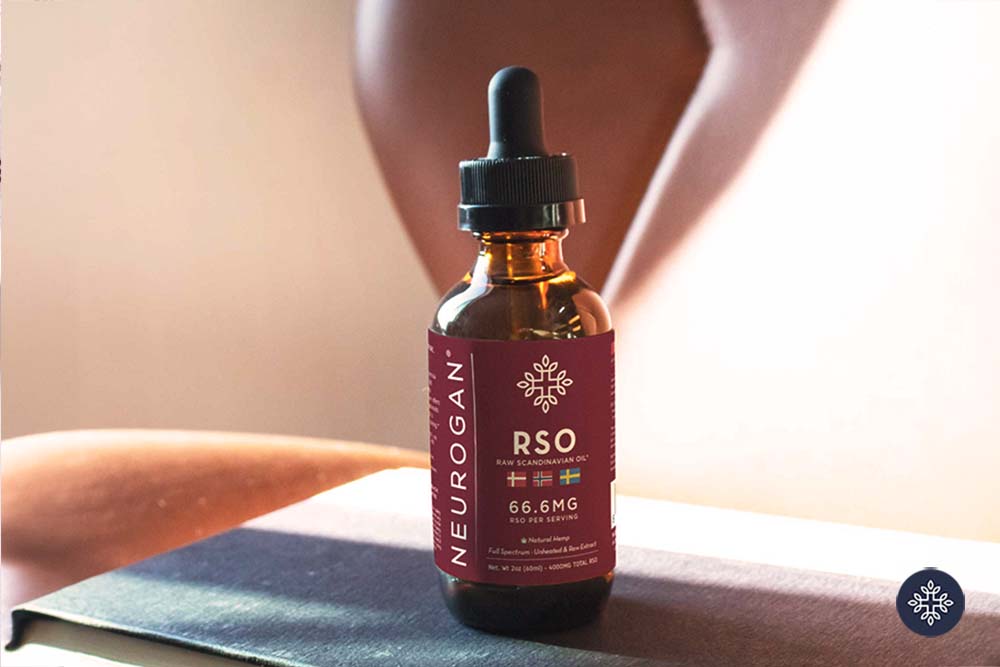
There is anecdotal evidence and some limited research suggesting that Rick Simpson Oil (RSO) may have potential pain-relieving properties, primarily due to its high THC (tetrahydrocannabinol) content. THC is a psychoactive compound in cannabis known for its pain-relieving potential.
Some individuals have reported using RSO to alleviate various types of pain, including chronic pain, neuropathic pain, and pain associated with conditions like arthritis. However, scientific evidence supporting the effectiveness of RSO for pain management is still in its early stages, and more research is needed to establish its safety and efficacy.
Additionally, the use of RSO may be subject to legal restrictions depending on the jurisdiction, as cannabis regulations vary widely. Before considering RSO or any cannabis product for pain relief, it’s a good idea to consult with a healthcare professional to discuss individual health circumstances.
While there are personal testimonies of reported benefits from using RSO for pain relief, you want to make sure that you approach these claims with caution as scientific evidence is limited, and individual responses to cannabinoids can vary. That said, here are some potential ways in which RSO might be associated with pain relief based on anecdotal reports and the known properties of its primary component, THC.
RSO Oil for Back Pain

Many people experience the annoyance of back pain, whether it's caused by prolonged sitting in an office chair, an injury, exercise fatigue, or other reasons, hindering their daily activities.
Because of RSO’s high THC and terpene content, many people turn to RSO for pain relief. This highly concentrated cannabis product can be especially effective for managing back pain. People frequently use RSO to relieve back pain associated with back injuries and chronic conditions like degenerative disc disease.
Integrating cannabis into your holistic health journey may not be new to you, so why should you consider RSO specifically?
RSO is a highly concentrated cannabis product. THC, the psychoactive compound in cannabis is a significant component of RSO, and has known analgesic properties [1]. This is a reason how RSO It may help reduce the perception of pain by interacting with the endocannabinoid system in the body, which plays a part in regulating inflammation, pain perception, mood, and more.
Many people find RSO’s potency helps manage back pain and inflammation better than other cannabis products. On top of this, THC may have muscle-relaxant effects, potentially helping to alleviate tension or spasms in the back muscles [2].
RSO Oil for Chronic Pain
RSO is often praised for its potential benefits in managing chronic pain due to its high concentration of cannabinoids, notably THC and CBD.
In some studies, these cannabinoids can potentially support health inflammation, and modulate pain perception, which subsequently shows potential for various health issues associated with chronic pain [3].
The course of treatment for chronic pain conditions relies on the underlying cause, so it’s important that you get personalized advice from your healthcare professional before seeking complementary measures, like RSO oil.
RSO Oil for Inflammation
Personal testimonies have reported relief from conditions associated with inflammation, like arthritis or autoimmune disorders, but we need to mention that the FDA has not approved RSO or any other over-the-counter cannabis product to treat these conditions.
THC and CBD interact with the endocannabinoid system, influencing various physiological processes, including inflammation.
CBD (cannabidiol) has been studied for its potential anti-inflammatory properties, and there is evidence to suggest that it may have a positive impact on inflammation in the body [4].
Best RSO Brands for Pain Relief
- The Best Maximum Relief Gummies: Neurogan RSO Gummies
- The Topical Relief: Treeworks Canna Cream
- The Syringe Backed Option: Doctor Solomon’s CBD: THC RSO
- The Strongest RSO Choice: Neurogan RSO Capsules
- The Beginner’s Choice: Nature’s Heritage RSO Capsules
1. Neurogan RSO Gummies
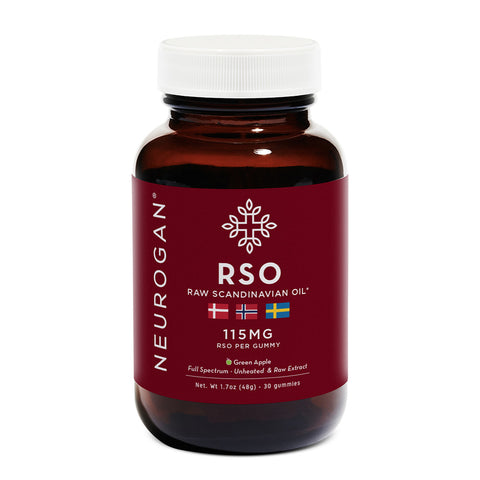
Our RSO gummies tap into our Scandinavian heritage with a blend of cannabinoids and terpenes. At Neurogan, we know the value of holistic healthcare, and these gummies were designed to help you on your own health journey.
These are different from traditional RSO (Rick Simpson Oil) as the RSO stands for Raw Scandinavian Oil. These still contain a very high concentration of raw cannabinoids and terpenes, but we’ve formulated them into easy-to-use form factors from gummies, oils, and capsules.
Each gummy contains 115 mg of Raw Scandinavian Oil which is a mix of CBD, CBG, CBDa, and THC (within the legal federal limit).
We recommend this product because of its delightful flavor and easy customization. The gummy form makes it easy to adapt to the RSO dosage to your preference. With the option to cut the gummy in half if you want a lower dose, this is an excellent product for anyone, regardless of their prior CBD experience.
- Price: $70
- Gummy Count: 30 Gummies
- Total Dose: 3450mg RSO
- Dose Per Serving: 115mg
- Flavor: Green Apple
- Discount: Subscribe & save 25% per bottle. Most RSO products cost up to 100 dollars per gummy jar because of the cannabinoid profile.
2. Treeworks Canna Cream
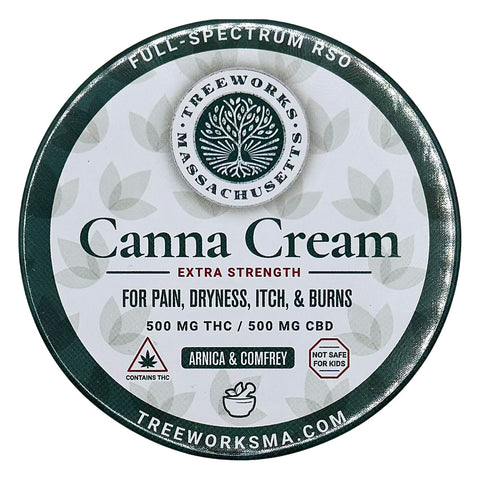
Treeworks Canna Cream combines the high potency RSO cannabinoids in a topical format that many people enjoy for localized discomfort from sore backs, neck kinks, and joint and muscle stiffness.
Treeworks Canna Cream promises ultimate relief without the systemic effects of consuming cannabis products. A full spectrum RSO infused with other healing herbs makes this cream a great product for someone who wants to use hemp to complement other pain management strategies.
- Price: $40
- Total CBD/CBN Content: 300mg
- CBN/CBD Per Serving: 45mg CBD+ 45mg CBN
3. Doctor Solomon’s CBD: THC RSO
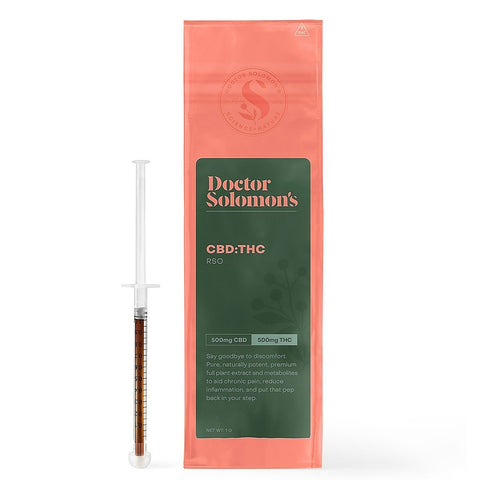
Dr. Solomon's RSO is a classic RSO product and can be swallowed or applied topically, making this product an adaptable choice.
They offer four different blends of RSO extract, but we recommend the 1:1 CBD: THC blend for a more balanced effect profile, especially when ingested.
With laboratory-grade quality control, this product is a good option because its ingestion and dosage can be customized. Add it to any food or drink, take it straight from the syringe, or apply it topically.
- Price: $55
- Total CBD/CBN Content: 1g CBD + 1g THC
- CBN/CBD Per Serving: Approximately 1000mg cannabis
4. Neurogan Capsules
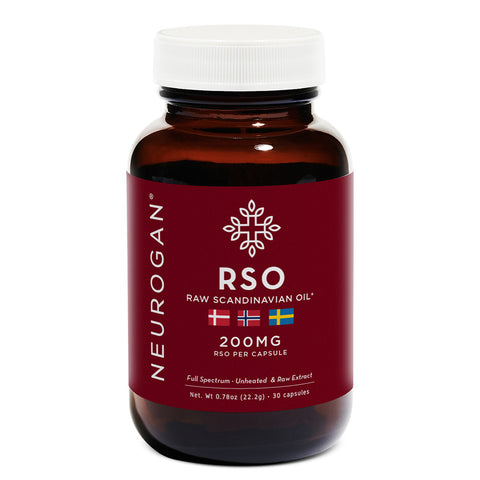
Our own RSO Capsules are a unique take on traditional cannabis concentrates, crafted to deliver exceptional potency and value. Unlike Rick Simpson Oil, our formula is known as Raw Scandinavian Oil—inspired by our heritage and made using full-spectrum, unheated hemp extract. Each capsule contains a powerful blend of cannabinoids and terpenes that may enhance relaxation and support overall wellness.
With its high dose per serving at an affordable price point, this RSO product has quickly become a favorite for our customers seeking a cannabis product that offers looking for a no-fuss, high potency hemp product Our line of RSO products offers a variety of options tailored to your preferences and lifestyle, making it easy to incorporate RSO into your daily routine.
- Price: $50
- Total Capsules: 30 Capsules
- Total Dose: 6000 MG RSO
- Dose Per Serving: 200mg RSO
- Discount: Subscribe & save 25%
5. Nature’s Heritage Capsules
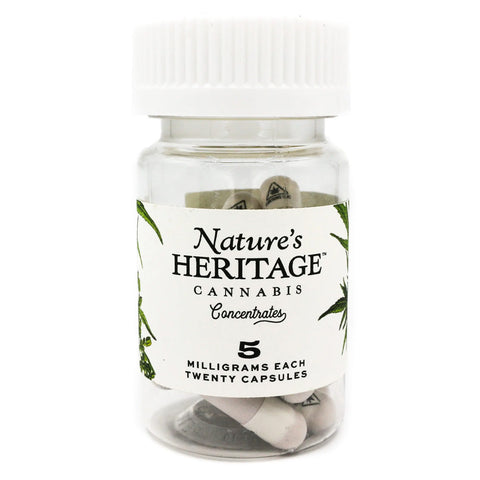
Nature Heritage’s Capsules are a great choice for those new to RSO — they’re portable and less intimidating than the syringe container that it typically comes in.
This is made from high THC cannabis plants, which means they may not be available in every state and the price point may vary depending on the dispensary. These capsules are precision dosed and come in 5, 25, and 100 mg of THC. Don’t be fooled by the 5 mg THC starting dose, this is a much more potent RSO than your regular CBD products and higher doses of 25 and 100 mg RSO may get you high ahnd should only be used with those with prior THC experience.
- Price: NA
- Total Capsules: 20 capsules
- Total Cannabinoid: 100mg THC
- THC Per Serving: 5, 25, 100
Using RSO for Pain, Options & Conclusion
Rick Simpson Oil can be a great place to start when exploring holistic options for pain management alongside advice from your healthcare practitioner. RSO has a high concentration of cannabinoids that can give it a leg up on traditional CBD or THC oils and edibles. Because these are highly concentrated products, start low with your dosage and find what works best for your body.
There are RSO products like the ones we have from Neurogan, made with hemp, which is federally legal, and then there are the traditional RSO made from high THC cannabis plants (marijuana) that may only be available at licensed dispensaries where cannabis is legal.
RSO Oil FAQ
Does it matter which RSO product I use?
The effectiveness and suitability of a particular Rick Simpson Oil (RSO) product can depend on various factors, including the oil's source, quality, and composition.
Different cannabis strains can have distinct profiles of cannabinoids and terpenes, leading to varied effects. Some strains may be more relaxing, while others may be energizing. Consider your individual preferences and health goals.
Ultimately, the "best" RSO product depends on your individual needs, preferences, and health considerations. We recommend reading product reviews, checking with your local laws, and, if possible, consulting with healthcare professionals or cannabis experts to make an informed decision.
How do I use RSO oil to manage pain?
The most common way to take RSO is sublingually, or under the tongue. Use a syringe or dropper to place a dose of RSO under your tongue and hold it there for 30-90 seconds before swallowing. This method ensures quick absorption into your bloodstream while allowing the rest of the RSO to pass through your digestive system, providing long-lasting pain relief.
You can also mix it into food or take capsules if you dislike the oil’s potent taste. RSO can even be applied topically to address localized pain, such as joint pain or back pain.
Can RSO be used to treat cancer?
RSO is not approved for cancer treatment by the FDA. The use of Rick Simpson Oil (RSO) as a treatment for cancer is a topic that has generated considerable interest and discussion. Rick Simpson himself claims that he used RSO to treat his skin cancer, and he has been a prominent advocate for the alleged cancer-fighting properties of cannabis oil, but these claims are often debated.
The National Cancer Institute has supported cannabis-related research [5]. And research on medical marijuana and its potential effects on cancer cells and cancer-related symptoms is currently ongoing [6].
However, it’s important to note that the scientific evidence supporting RSO or cannabis oil as a definitive treatment for cancer is limited and inconclusive. While some preclinical studies and anecdotal reports suggest that cannabinoids, including THC and CBD found in cannabis, may have anti-cancer properties, more rigorous clinical research is needed to establish their safety and efficacy for treating various forms of cancer.
References:
- Elikottil, J., Gupta, P., & Gupta, K. (2009). The analgesic potential of cannabinoids. Journal of opioid management, 5(6), 341.
- Mack, A., & Joy, J. (2000). Marijuana and muscle spasticity. In Marijuana as Medicine? The Science Beyond the Controversy. National Academies Press (US).
- Nagarkatti, P., Pandey, R., Rieder, S. A., Hegde, V. L., & Nagarkatti, M. (2009). Cannabinoids as novel anti-inflammatory drugs. Future medicinal chemistry, 1(7), 1333-1349.
- Atalay, S., Jarocka-Karpowicz, I., & Skrzydlewska, E. (2019). Antioxidative and anti-inflammatory properties of cannabidiol. Antioxidants, 9(1), 21.
- Ellison, G. L., Alejandro Salicrup, L., Freedman, A. N., Fu, Y., Ross, S., Johnson, R. L., ... & White, J. D. (2021). The National Cancer Institute and Cannabis and Cannabinoids Research. JNCI Monographs, 2021(58), 35-38.
- Kramer, J. L. (2015). Medical marijuana for cancer. CA: a cancer journal for clinicians, 65(2), 109-122.



